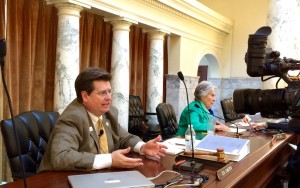(UPDATED, 12:20 p.m., with comment from State Department of Education.)
Seven school districts opted out of a statewide high school WiFi system to write their own contracts last year — but still, the contractor for the statewide system received more than $238,000 for work in those districts.
That’s one finding from a state audit of the controversial 2013 WiFi contract, presented Thursday morning to the Joint Finance-Appropriations Committee. But a State Department of Education official says some of this money reflects payment for WiFi provided by the contractor — and he says the state has a mechanism to get the rest of the money back.
The audit report weaves a complicated narrative about which districts are opting in to the statewide system, which districts are deciding to go it alone — and how many students, teachers and administrators are using the statewide system.
Much of Thursday’s discussion focused on the opt-out issue, and money prepaid to Education Networks of America, the contractor on the statewide WiFi system.
The seven districts in question — Bonneville, Filer, Hagerman, Jefferson County, Kellogg, Post Falls and Wendell — decided in 2014 to pull out of the ENA network and pursue their own contracts. The 2014 Legislature allowed districts to opt out, after some lawmakers blasted then-Superintendent Tom Luna’s decision to sign a contract with ENA that could be extended for up to 15 years.
But when these districts opted out, ENA still received $72,915 in pro-rated payments for the rest of the 2013-14 budget year, which ended June 30. ENA also received $165,396 to cover the cost of providing WiFi in the seven districts in 2014-15; this money was prepaid to the contractor from the 2013-14 state appropriation for the WiFi system.
The $72,915 reflects payments for WiFi ENA provided before June 30, said Will Goodman, the state’s chief technology officer. And ENA will be entitled to some of the $165,396, he said — for WiFi provided after July 1, or for its cost of pulling out WiFi equipment. As for the remainder, said Goodman, the state will be able to settle the books by deducting this amount from future payments to ENA.
For now, it doesn’t appear that the state has actually wound up paying twice for WiFi service. Under the 2014 opt-out plan, districts can seek and receive state money to cover the cost of their own systems.
None of the seven districts have received payments from the state — yet. Post Falls will receive $32,823 shortly, Goodman said. Filer has been authorized to receive reimbursement from the state for its WiFi service. That sum hasn’t been set yet, and will be set based on student population.

JFAC co-chairman Dean Cameron, an outspoken critic of the 2013 WiFi contract, said it was “highly unusual” for the state to prepay for contract services.
“The prepayment was surprising to us as well,” said April Renfro, manager of the state’s legislative audits division. “We weren’t expecting it to be prepaid.”
However, the possibility of double payment did arise during the 2014 session. At the time, Cameron said the opt-out plan might wind up costing more in the short term, as the state reimburses districts and continues to pay under the ENA contract.
The WiFi contract is separate from the voided contract for the Idaho Education Network, a statewide high school broadband system. That contract was thrown out in district court in Ada County. ENA, based in Nashville, Tenn., is a contractor on both projects.
Under the WiFi contract, the state pays ENA $21 for every user of the system — students, teachers and administrators alike. Nearly 72,500 users are on the system now, according to the audit, which would mean ENA is entitled to about $1.5 million in 2014-15.
The ENA system is in widespread use, although enrollment has dropped slightly. In all, 178 of the state’s 242 traditional and charter high schools are on the system, down from 183 schools in 2013-14.
